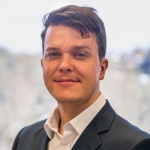For many countries, their plan for the future focuses on a transition to a smart jobs economy. And for many organisations, the key to thriving in an innovative jobs economy centres on bringing talented individuals—with a particular focus on technology—and connecting them with roles that best utilise their talents.
Talent doesn't just appear readily made. It takes years of education, hands-on training and mentoring before a student is ready to make a significant impact in an innovative organisation. Networking is another critical aspect that can be overlooked. Networking is often the crucial difference maker in launching a student's career to the next level.
One of the most impactful ways that individuals in technology can harness their skills is by tackling some of society’s most pressing challenges, like how to break the cycle of more than 350 million children trapped in poverty across the world.
SAS and the University of New South Wales (UNSW) Interdisciplinary Partner Project is one example of this, displaying the power of analytics when it's complemented with opportunity and support.
Solving real-world problems
One of the natural sources of inspiration for the SAS Data for Good program is an organisation called Zoe Empowers. Zoe Empowers is an empowerment ministry for orphaned and vulnerable children living in life-threatening poverty in Africa and India. Through its work, young participants have moved from the hopelessness of poverty to meeting their needs in areas such as food security, secure housing, education and income generation, to name a few.
Six students studying at the University of New South Wales (UNSW) in Australia were offered the opportunity through SAS and UNSW's Interdisciplinary Partner Project to tackle the issue of poverty and dive deeper into the work of Zoe Empowers. The chance to form a team and examine data from Zoe Empowers and see how analytics could address some of these urgent real-world issues was rewarding for everyone involved.

- (The UNSW Student Team, L-R: Leanne D'Sylva, Insub (Ian) Jeon, Apoorv Asheesh Maroo, Jia (Jaye) Muk, Siwen (Sven) Ren and Pooja Saianand)
Understanding the task at hand and driving results
The team’s brief was to analyse datasets from Zoe Empowers' using advanced analytics, including data analysis and data visualisation techniques to deliver recommendations for data improvements. Two datasets on poverty in Kenya and Rwanda were provided as part of the case study. The students also used analytics to measure the program's overall effectiveness and identify potential areas of improvement.
The UNSW students were not only empowered by the opportunity to solve a real-world problem but the professional support and mentoring from SAS on using analytics empowered the students to share insights on design thinking and project management. Furthermore, students got creative and used additional datasets to understand better the environment in which Zoe Empowers was operating.
Sven Ren, an electrical engineering student at UNSW, found that participating in this project rapidly developed his understanding of business analysis and his ability to use analytics tools and techniques to solve problems.
"As a researcher in the field of machine learning and data science, this project is a brilliant chance for me to gain more experience relating to a real-world problem,” Ren said.
Overcoming challenges and collaborating to solve issues
One of the unique aspects of the team was that it was very much an interdisciplinary project – bringing together students studying in different UNSW faculties.
The team collaborated closely, building their student and professional networks. Then, after the ten-week project—they presented as a team to SAS and UNSW—they received feedback and further coaching to encourage the development of their analytical skills using SAS® Viya® and business analysis. The team made exciting recommendations, including leveraging publicly available funds to help those in need for projects such as:
- Australia’s Direct Aid Program (DAP) provides financial assistance to eligible groups or organisations undertaking suitable small-scale development projects.
- Youth Enterprise Development Fund provides loans and market support to youth-owned enterprises and helps facilitate youth enterprises to develop linkages with large enterprises.
For Ian Jeon, studying computer science at UNSW, the project's biggest challenge was engagingly conveying the most critical findings, adding that he didn't expect to be creating characters and plotlines when expressing findings. "It was a great insight into the trial and error of storytelling with data," Jeon said.
And for Jaye Muk, studying actuarial studies and commerce at UNSW, the opportunity to connect study and a pressing real-world problem significantly uplifted her student experience.
“It was a fruitful journey where I learned so much about SAS software, its giving culture and support teams. Not only was this opportunity an inspirational eye-opener to data visualisation, but it has also allowed me to work and grow with amazing individuals on a purposeful project,” said Muk.
As these students continue their educational journey, they also have an eye on their next steps as they consider their future career aspirations. Leanne D’Sylva focuses on turning this experience into an internship, adding, “I had so much fun undertaking this project with SAS. It has encouraged me to seek my next opportunity. I look forward to using the skills from the Zoe Empowers project in an internship or data analysis job in the near future.”
Apoorv Maroo, studying a Master of Commerce, majoring in business analytics and innovation at UNSW, found great value in the experience adding, "This program with SAS taught me to persevere till I got it right and that is something that I will be taking into my next internship which is with UNSW itself.”
Taking part in a project like this offers students an array of skills and experiences. From technical skills to applying analytics to solve pressing problems through crafting a story with those findings and communicating its impact, soft skills like the importance of perseverance and curiosity when tackling issues. Perhaps the most important of all was the importance of purpose in work and how urgently-needed skills in STEM can help create a better world.

